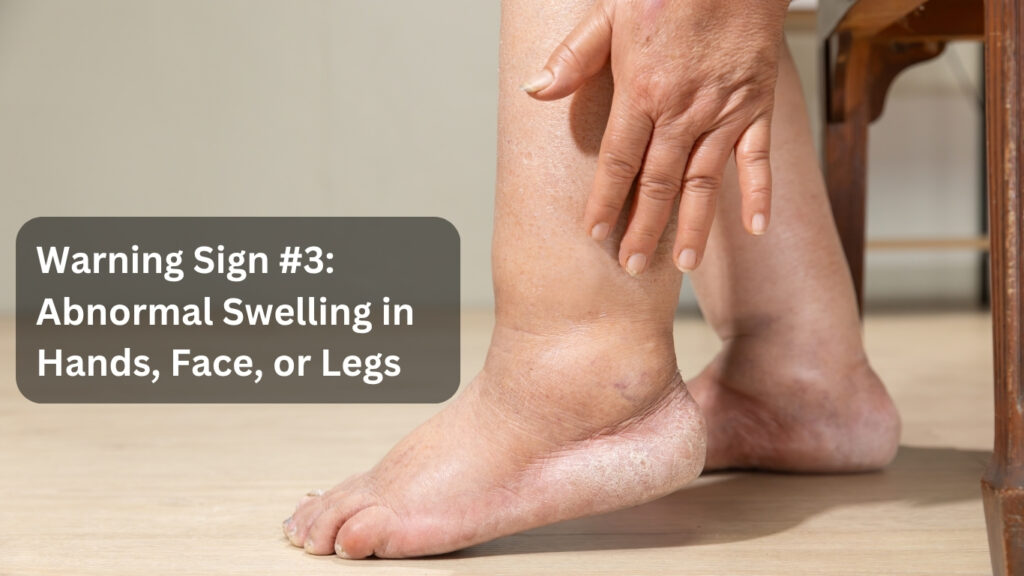Understanding the Importance of Pregnancy Warning Signs
Pregnancy is a time of transformation, and while many changes are perfectly normal, some symptoms can signal something more serious. Recognizing pregnancy warning signs early on is critical to protecting both your health and your baby’s.
Even if you’ve had a healthy pregnancy so far, it’s important to know the difference between expected discomforts and dangerous pregnancy symptoms. Some signs may appear mild at first, but can develop into serious complications if ignored.
This guide covers five of the most critical pregnancy red flags, along with additional symptoms that deserve your attention. If you experience any of the issues below, don’t wait knowing when to call your doctor during pregnancy can make all the difference in ensuring a safe outcome for you and your baby.
Warning Sign #1: Vaginal Bleeding or Spotting
Some spotting can be harmless, especially in early pregnancy. However, vaginal bleeding during pregnancy should never be ignored, particularly if it’s heavy, persistent, or accompanied by cramps.
What’s Normal vs. What’s Dangerous
- Light spotting can occur after intercourse or implantation in early pregnancy and may not be a cause for concern.
- Bright red bleeding, clots, or flow similar to a period especially in the second or third trimester may indicate signs of pregnancy complications such as miscarriage, placenta previa, or placental abruption.
When to Call the Doctor During Pregnancy
Call your provider immediately if you experience:
- Heavy bleeding
- Bleeding with cramping or lower back pain
- Dizziness or fainting
- Any bleeding after the second trimester
When in doubt, it’s always safest to contact your OB-GYN. Clinics like East Coast OBGYN advise patients to treat any unexplained bleeding as a potential pregnancy emergency symptom, regardless of the stage of pregnancy.
Warning Sign #2: Severe Headaches and Vision Changes
Occasional headaches can be a normal part of pregnancy, but when they’re intense, persistent, or paired with visual disturbances, they could point to something more serious, especially if you’re past 20 weeks.
Potential Links to High Blood Pressure or Preeclampsia
Severe headaches that don’t go away with rest or medication may indicate high blood pressure, a leading cause of preeclampsia a dangerous pregnancy condition that affects both mother and baby.
Symptoms to watch for include:
- Blurred vision or light sensitivity
- Seeing spots or flashing lights
- Pain in the upper right abdomen
- Sudden weight gain
Warning Signs of Preeclampsia to Watch For
- Severe headache unrelieved by Tylenol
- Swelling in the face or hands (more than usual)
- Vision changes or seeing floaters
- Elevated blood pressure at routine checks
These warning signs of preeclampsia are considered pregnancy emergency symptoms. Don’t wait—contact your provider or head to an emergency room immediately if they occur.

Warning Sign #3: Abnormal Swelling in Hands, Face, or Legs
Mild swelling is common in pregnancy, especially in the feet and ankles. But sudden or excessive swelling, particularly in the face, hands, or one leg, can be a sign of a serious problem.
What Counts as Normal Pregnancy Swelling
- Swelling that develops slowly, especially by day’s end
- Puffiness in feet and ankles after standing for long periods
- General water retention in hot weather
These symptoms usually improve with rest and hydration.
Red Flags That Require Immediate Medical Attention
- Rapid onset of swelling in the face or hands
- Swelling that doesn’t go down overnight
- One leg is significantly more swollen than the other (possible blood clot)
- Accompanied by headache, vision changes, or high blood pressure
These could be linked to dangerous pregnancy symptoms like preeclampsia or deep vein thrombosis. Always report sudden or severe swelling to your OB-GYN promptly to rule out complications.
Warning Sign #4: Reduced or No Fetal Movement
Feeling your baby move is one of the most reassuring parts of pregnancy. While movement patterns can vary, a noticeable decrease in activity may indicate a potential complication.
How Much Movement Is Normal by Trimester
- Second trimester: You may start to feel flutters (quickening) around 18–22 weeks.
- Third trimester: Movements become stronger and more regular. Most providers recommend doing kick counts—you should feel at least 10 movements in 2 hours.
What to Do if You Notice a Sudden Decrease
- Drink something cold or lie on your side to stimulate movement.
- If movement doesn’t pick up within a couple of hours, call your doctor immediately.
Decreased or absent fetal movement is one of the key signs of pregnancy complications that could point to issues like placental problems or fetal distress. Prompt evaluation can make all the difference.

Warning Sign #5: Persistent Cramps or Severe Back Pain
Some level of discomfort is expected during pregnancy, especially as your body adjusts to the growing baby. However, persistent cramps or severe back pain can be more than just routine aches.
When Pain Indicates a Serious Issue
- Cramping that feels like strong period pain
- Back pain that is sharp, constant, or radiating
- Pain that comes with bleeding, pressure, or contractions
These could signal preterm labor, urinary tract infections, or placental complications—all pregnancy red flags that require urgent care.
If the pain doesn’t subside with rest, hydration, or changing positions, or if it comes in waves, it’s time to contact your provider. Ignoring such pregnancy warning signs could risk both maternal and fetal well-being.
Additional Dangerous Pregnancy Symptoms to Know
While the top five warning signs are among the most urgent, there are other symptoms that may also signal serious issues. Staying informed and vigilant can help prevent complications before they escalate.
Chest Pain, Shortness of Breath, or High Fever
- Sudden chest pain or tightness could point to a heart or lung issue.
- Difficulty breathing or rapid breathing may signal a clot or cardiovascular stress.
- A fever over 100.4°F (38°C) that doesn’t improve with medication could indicate infection.
These are all pregnancy emergency symptoms that warrant immediate attention.
Sudden Weight Gain or Fluid Retention
- Gaining more than 4–5 pounds in a week (especially with swelling) could be linked to preeclampsia.
- Severe bloating or fluid buildup should also be discussed with your provider.
Whether it’s your first pregnancy or not, unusual symptoms should never be dismissed. When in doubt, reach out to a qualified OB-GYN like those at East Coast OBGYN to get professional advice quickly.
Final Thoughts: Don’t Ignore These Pregnancy Red Flags
Your body gives you signals for a reason, especially during pregnancy. Recognizing and acting on pregnancy warning signs is one of the most important things you can do to protect your health and your baby’s well-being.
While some symptoms may feel uncertain or even minor at first, they can quickly become dangerous pregnancy symptoms if left unchecked. From unusual bleeding to changes in fetal movement, it’s always better to err on the side of caution.
Trust your instincts, stay informed, and never hesitate to reach out to your OB-GYN. At East Coast OBGYN, we emphasize compassionate, responsive care for every stage of your pregnancy journey—because peace of mind is priceless when it comes to motherhood.
FAQs
What are the top warning signs during pregnancy?
The most critical signs include vaginal bleeding, severe headaches, vision changes, abnormal swelling, reduced fetal movement, and persistent cramps or back pain. These symptoms could signal complications and should be addressed by a healthcare provider immediately.
Is any vaginal bleeding normal while pregnant?
Light spotting can be normal, especially early in pregnancy. However, heavy bleeding, bleeding with cramps, or any bleeding in the second or third trimester should be evaluated by a doctor right away.
When should I be concerned about headaches and vision issues?
If you experience severe headaches that don’t respond to medication, along with blurred vision, seeing spots, or light sensitivity, contact your provider. These could be warning signs of preeclampsia
What counts as abnormal swelling in pregnancy?
Sudden swelling in your face, hands, or one leg is not typical and could be a pregnancy red flag. Always mention new or severe swelling to your OB-GYN.
What if I feel reduced fetal movement?
Decreased movement, especially in the third trimester, should be taken seriously. Try drinking something cold and lying on your side. If there’s still no movement within two hours, contact your provider immediately.
Are severe back pain or persistent cramps dangerous?
Yes—especially if they are accompanied by bleeding, pressure, or a sense of tightness. These could indicate preterm labor or other complications.

